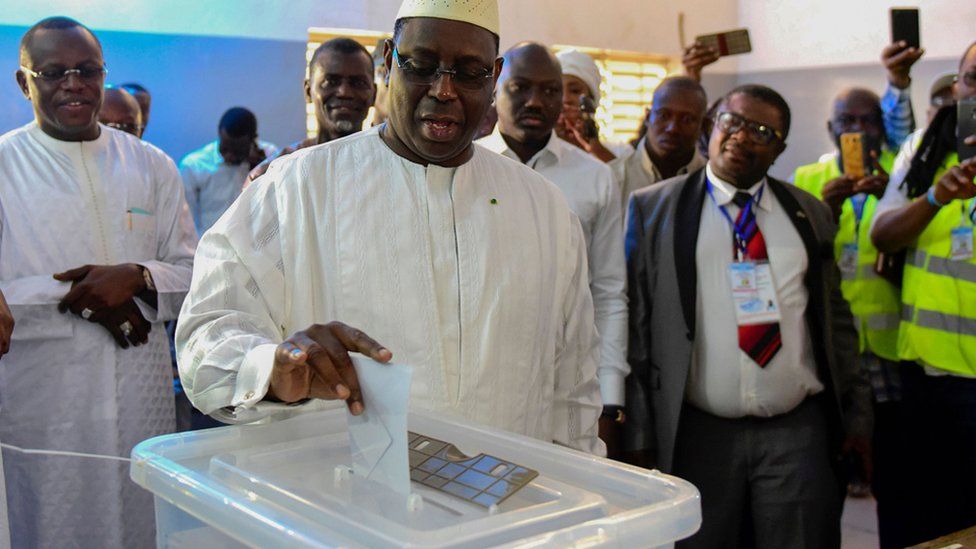
Image caption,
President Macky Sall, elected for a second time in 2019, has said he will not run again
By Will Ross
Africa editor, BBC World Service
There is international concern about the political situation in Senegal after President Macky Sall called off this month’s election citing a row over the eligibility of candidates.
The West African regional bloc Ecowas and the US urged the authorities to clarify when the vote will take place, as no new date was set.
France and the EU have also called for an election as soon as possible.
Senegal has been seen as one of the most stable democracies in West Africa.
President Sall’s reiteration that he will not run for a third term has been welcomed, but there is worry about the uncertainty created by a lack of an electoral timetable. The vote was supposed to have taken place in three weeks’ time.
Uncertainty has played a role in deadly protests in the past as has the opposition allegation that politically motivated cases were being brought against potential candidates.
For months, speculation that Mr Sall was seeking a third term fuelled opposition protests that led to violence and many deaths. He finally declared he was not seeking a third term in July.
An opposition candidate called the president’s decision to postpone the election a constitutional coup.
Khalifa Sall, former mayor of the capital, Dakar, urged people to protest against the move and his political coalition has pledged to go to court.
Karim Wade, the son of a former president, was one of dozens who had been deemed ineligible by a constitutional council. This is because he is allegedly a French citizen as well as being Senegalese, an accusation that he has described as “scandalous”, the AFP news agency reports.
On Friday, his party, angry at his exclusion, urged parliament to postpone the vote. They had questioned the neutrality of two of the judges on the panel that decided on the final list of candidates.
Whether the various international calls will make any difference is hard to say.
France no longer has the clout it once had in its former colonies across West Africa.
Senegal’s stability will be tested if some of the opposition politicians who were against the delay manage to organise large street protests.
Mr Sall’s critics suggest he may have feared his chosen successor, Prime Minister Amadou Ba, was in danger of losing the election.
On Saturday, the president cancelled the election following complaints over those who had been excluded from the poll.
Mr Sall said “these troubled conditions could gravely hurt” the ballot.
He added that he would start “an open national dialogue… to create the conditions for a free, transparent and inclusive election in a peaceful and reconciled Senegal”.
Twenty candidates had made the final list, but, in addition to Mr Wade, among the most prominent of those who had been excluded from the original vote was opposition politician Ousmane Sonko.
The popular figure was barred because of a libel conviction. Sonko, who has faced a number of court cases, said he had been the victim of a campaign to stop him standing for president.
>>> Read full article>>>
Copyright for syndicated content belongs to the linked Source : BBC News – https://www.bbc.co.uk/news/world-africa-68194644?at_medium=RSS&at_campaign=KARANGA